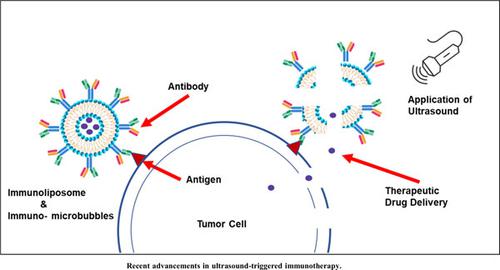Current Protein & Peptide Science ( IF 1.9 ) Pub Date : 2021-05-31 , DOI: 10.2174/1389203722666210212125526 Debasmita Mukhopadhyay 1 , Amal Ahmed 1 , Catherine Sano 2 , Nahid Awad 1 , Nour Al Sawaftah 1 , Ghaleb A Husseini 1

|
Over the past few decades, immunotherapy has emerged as a promising therapeutic approach to treat some types of cancer. Moreover, antibody-based cancer therapies can trigger apoptosis and cell growth inhibition to induce immune cell destruction of target cells through antibody-dependent cellular cytotoxicity (ADCC). Nevertheless, immunotherapeutic efficiency is often restricted due to deficient delivery or low accumulation of therapeutic molecules at the tumor site. The development of pegylated liposomes with monoclonal antibodies conjugated to their surfaces (immunoliposomes) and triggered with ultrasound can effectively improve drug accessibility by enhancing cell membrane permeability and drug release. This review summarizes existing traditional cancer treatments and their limitations, emphasizing the recent advancements in ultrasound-triggered immunotherapy.
中文翻译:

用于癌症治疗的超声触发免疫疗法:更新
在过去的几十年中,免疫疗法已成为治疗某些类型癌症的有前途的治疗方法。此外,基于抗体的癌症疗法可以触发细胞凋亡和细胞生长抑制,从而通过抗体依赖性细胞毒性 (ADCC) 诱导靶细胞的免疫细胞破坏。然而,由于在肿瘤部位的递送不足或治疗分子的低积累,免疫治疗效率通常受到限制。开发具有缀合到其表面的单克隆抗体(免疫脂质体)并由超声触发的聚乙二醇化脂质体可以通过增强细胞膜通透性和药物释放来有效地改善药物可及性。本综述总结了现有的传统癌症治疗方法及其局限性,









































 京公网安备 11010802027423号
京公网安备 11010802027423号